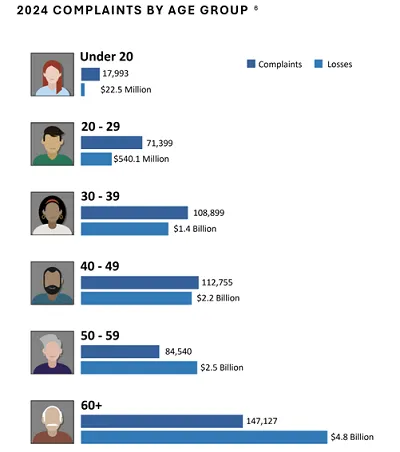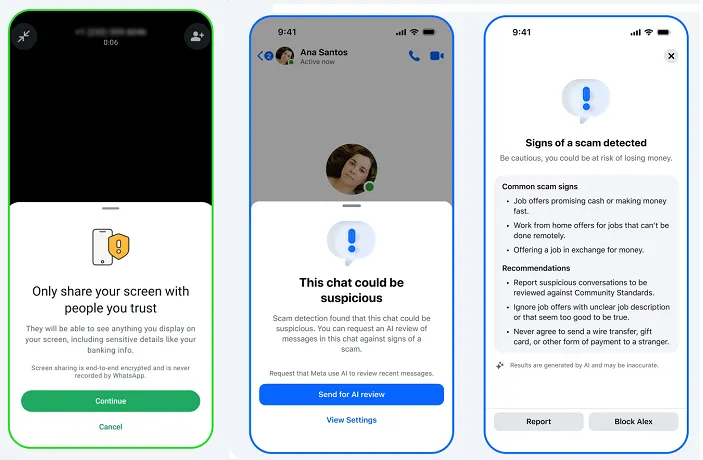Meta Rolls Out Anti-Scam Alerts for Older Users
 Adshine.pro10/22/202514 views
Adshine.pro10/22/202514 viewsMeta is stepping up its efforts to protect older internet users from online scams — because, let’s face it, they’re often the ones who fall prey to the latest “Nigerian inheritance,” “Amazon customer service,” or “Facebook password” schemes.
And before anyone gets offended, this isn’t speculation — it’s data-backed reality.
According to the FBI’s Internet Crime Report, individuals over the age of 60 filed the highest number of complaints and recorded the biggest financial losses in 2024, collectively losing a staggering $4.8 billion to online scams.

Online fraud continues to be a massive issue, and the gap in digital literacy is one of the key factors that scammers exploit. To address this, Meta is rolling out new alerts to help older users spot potential scams. The company is also sharing practical advice that you can pass along to your parents, uncles, or aunts who spend too much time scrolling through Facebook.
First, Meta is introducing new scam warnings on WhatsApp and Messenger to notify users about common fraud tactics.

As shown in these examples, WhatsApp will now display alerts when users initiate screen sharing — a feature scammers often exploit to gain unauthorized access. Meanwhile, Messenger is testing an upgraded scam detection system within chats.
According to Meta:
“When this feature is active and a new contact sends a potentially suspicious message, users will be warned and given the option to send recent chat messages for AI-powered scam review. If a potential scam is detected, users will receive more details about common fraud types and recommended actions, such as blocking or reporting the account.”
These measures aim to highlight common scam techniques and raise awareness of vulnerabilities that criminals often exploit.

Additionally, the company outlined a few of the most common scams targeting older users:
- Fake home renovation and debt relief schemes: Fraudsters have created websites that pretend to offer government benefits or low-cost home improvement programs for seniors. These scams often rely on paid ads on platforms like Facebook and Google to collect personal information.
- Fraudulent money recovery services: Some scammers impersonate the FBI’s Internet Crime Complaint Center (IC3), claiming they can help victims recover lost funds — including from cryptocurrency fraud. They’ve used fake accounts across multiple platforms such as Facebook, Instagram, Telegram, Threads, TikTok, YouTube, and X.
- Fake customer service representatives: Criminals pose as airline, bank, or retail support agents on social media, replying to user comments under official brand posts to lure them into private messages or fraudulent forms that harvest personal data.
These examples highlight the evolving sophistication of online scams. Meta also announced its partnership with the National Elder Fraud Coordination Center (NEFCC) — a nonprofit coalition involving law enforcement and major corporations like AARP, Amazon, Capital One, Google, Microsoft, and Walmart — dedicated to combating fraud targeting seniors.
“We’ll be collaborating with NEFCC members to fight fraud at local, state, and national levels, focusing on protecting older adults by sharing resources and supporting investigations into large-scale scam operations,” Meta stated.
Meta continues to conduct regular reviews of scam networks and has participated in multiple initiatives to combat fraudulent activity, including romance scams, across its platforms.
These are undeniably positive steps — initiatives that could help educate not only older users but everyone about online risks.
However, there’s a lingering irony here. While Meta is publicly championing user safety, it’s also aggressively promoting AI-generated content across its platforms — a trend that scammers are eagerly exploiting.
Take a scroll through Facebook right now and you’ll find countless AI-generated posts racking up thousands of likes — often serving as bait for scammers looking to expand their reach or resell popular pages.
It’s a contradictory stance: on one hand, Meta wants to protect vulnerable users from digital deception; on the other, it’s enabling the very technology that can blur truth and fiction even further.
Still, credit where it’s due — these new safety initiatives and educational efforts are steps in the right direction. At the very least, it’s something you can share with the Gen Xers and Baby Boomers in your life before the next “too-good-to-be-true” message lands in their inbox.
📢 If you're interested in Facebook Ads Account, don't hesitate to connect with us!
🔹 https://linktr.ee/Adshinepro
💬 We're always ready to assist you!